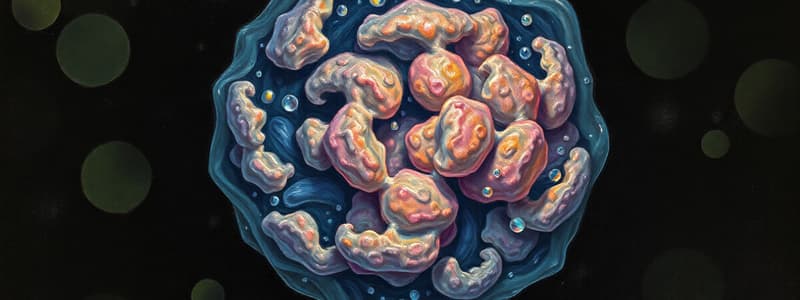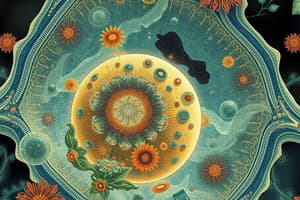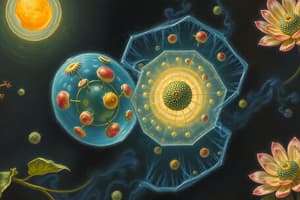Podcast
Questions and Answers
Which system is primarily responsible for protecting the body against pathogens and disease?
Which system is primarily responsible for protecting the body against pathogens and disease?
- Immune System (correct)
- Circulatory System
- Respiratory System
- Nervous System
What is a key characteristic of observational studies in biology?
What is a key characteristic of observational studies in biology?
- They manipulate variables to determine outcomes.
- They rely on theoretical models to predict behavior.
- They do not involve any interaction with the subjects. (correct)
- They are usually conducted in laboratory settings.
Which of the following best describes the process of speciation?
Which of the following best describes the process of speciation?
- The extinction of a species due to predation.
- The migration of species from one habitat to another.
- The decline of a species due to environmental changes.
- The formation of new and distinct species through evolution. (correct)
Which technique is associated with editing genes for potential advancements in medicine?
Which technique is associated with editing genes for potential advancements in medicine?
What kind of impact does climate change have on biodiversity?
What kind of impact does climate change have on biodiversity?
Which statement about cell theory is incorrect?
Which statement about cell theory is incorrect?
What is a primary function of proteins within biological systems?
What is a primary function of proteins within biological systems?
Which of the following best describes the distinction between prokaryotic and eukaryotic cells?
Which of the following best describes the distinction between prokaryotic and eukaryotic cells?
In the context of metabolism, what is the role of catabolism?
In the context of metabolism, what is the role of catabolism?
Which of the following scenarios best exemplifies natural selection?
Which of the following scenarios best exemplifies natural selection?
Which type of biomolecule primarily serves as the primary source of energy for living organisms?
Which type of biomolecule primarily serves as the primary source of energy for living organisms?
What best describes Mendelian genetics?
What best describes Mendelian genetics?
Which of the following correctly defines biodiversity?
Which of the following correctly defines biodiversity?
Flashcards are hidden until you start studying
Study Notes
Overview of Biology
- Definition: The study of living organisms, their structure, function, growth, origin, evolution, and distribution.
- Branches:
- Zoology: Study of animals.
- Botany: Study of plants.
- Microbiology: Study of microorganisms.
- Genetics: Study of heredity and variation.
- Ecology: Study of organisms and their environments.
Key Concepts
-
Cell Theory:
- All living organisms are composed of cells.
- The cell is the basic unit of life.
- All cells arise from pre-existing cells.
-
Homeostasis: The ability of an organism to maintain a stable internal environment despite external changes.
-
Metabolism: The sum of all chemical reactions in an organism, including catabolism (breaking down molecules) and anabolism (building up molecules).
-
Evolution: The process through which species change over time through natural selection and genetic variation.
Biological Molecules
-
Carbohydrates:
- Primary source of energy.
- Composed of sugars (monosaccharides, disaccharides, polysaccharides).
-
Proteins:
- Made of amino acids.
- Functions include catalyzing reactions (enzymes), structural roles, and transport.
-
Lipids:
- Fats and oils.
- Important for energy storage, membrane structure, and signaling.
-
Nucleic Acids:
- DNA and RNA.
- Store and transmit genetic information.
Cell Structure
-
Prokaryotic Cells:
- Simple, no nucleus (e.g., bacteria).
- Lack membrane-bound organelles.
-
Eukaryotic Cells:
- Complex, with a nucleus (e.g., animals, plants, fungi).
- Contain membrane-bound organelles (mitochondria, endoplasmic reticulum).
Genetics
-
DNA Structure:
- Double helix composed of nucleotides (adenine, thymine, cytosine, guanine).
-
Gene Expression:
- Process by which information from a gene is used to produce a functional product (usually proteins).
-
Mendelian Genetics:
- Principles of inheritance proposed by Gregor Mendel (dominant and recessive traits).
Ecology and Environment
- Ecosystems: A community of living organisms interacting with their physical environment.
- Biomes: Large geographical areas characterized by specific climates and ecosystems (e.g., rainforest, desert).
- Biodiversity: The variety of life in the world or in a particular habitat; essential for ecosystem resilience.
Evolutionary Biology
- Natural Selection: Mechanism by which individuals with favorable traits are more likely to reproduce.
- Speciation: The formation of new and distinct species in the course of evolution.
Human Biology
-
Systems:
- Circulatory: Transports blood, nutrients, gases.
- Respiratory: Facilitates gas exchange (oxygen and carbon dioxide).
- Digestive: Breaks down food and absorbs nutrients.
- Nervous: Coordinates body activities through nerve impulses.
-
Immune System: Protects against pathogens and disease.
Research Methods in Biology
- Observational Studies: Watching and recording behavior without manipulation.
- Experiments: Controlled tests to determine cause-and-effect relationships.
- Field Studies: Research conducted in natural environments.
Current Topics in Biology
- CRISPR and Genetic Engineering: Techniques for editing genes.
- Climate Change Impact on Biodiversity: How environmental changes affect species and ecosystems.
- Stem Cell Research: Potential for regenerative medicine and treating diseases.
Overview of Biology
- Study of living organisms, covering structure, function, growth, origin, evolution, and distribution.
- Branches include:
- Zoology: Focuses on animal life.
- Botany: Examines plant life.
- Microbiology: Investigates microorganisms.
- Genetics: Explores heredity and variation.
- Ecology: Studies interactions between organisms and their environments.
Key Concepts
- Cell Theory:
- All organisms consist of cells; cells are life's fundamental unit.
- New cells originate from existing cells.
- Homeostasis: Ability of an organism to maintain stable internal conditions regardless of external changes.
- Metabolism: Totality of chemical processes within organisms, encompassing both catabolism and anabolism.
- Evolution: Species undergo change over time through natural selection and genetic variation.
Biological Molecules
- Carbohydrates: Main energy source, made up of monosaccharides, disaccharides, and polysaccharides.
- Proteins: Composed of amino acids; functions include enzymatic reactions, structural support, and transport.
- Lipids: Encompasses fats and oils; critical for energy storage and cell membrane structure.
- Nucleic Acids: DNA and RNA, responsible for storing and transmitting genetic information.
Cell Structure
- Prokaryotic Cells: Simple structure lacking a nucleus; includes bacteria, no membrane-bound organelles.
- Eukaryotic Cells: Complex cells with a nucleus; includes animals, plants, and fungi, featuring membrane-bound organelles such as mitochondria and endoplasmic reticulum.
Genetics
- DNA Structure: Composed of nucleotides; forms a double helix, consists of adenine, thymine, cytosine, and guanine.
- Gene Expression: The process of translating genetic information into functional products, primarily proteins.
- Mendelian Genetics: By Gregor Mendel, outlines inheritance patterns of dominant and recessive traits.
Ecology and Environment
- Ecosystems: Communities of living organisms interacting with their environment.
- Biomes: Extensive geographical areas defined by their climates and ecosystems, such as rainforests and deserts.
- Biodiversity: Represents the variety of life in a given habitat, crucial for ecosystem resilience.
Evolutionary Biology
- Natural Selection: Process where advantageous traits enhance reproductive success.
- Speciation: Development of new and distinct species through evolutionary processes.
Human Biology
- Systems Overview:
- Circulatory System: Transports blood, nutrients, and gases.
- Respiratory System: Enables gas exchange of oxygen and carbon dioxide.
- Digestive System: Breaks down food and absorbs nutrients.
- Nervous System: Coordinates body functions via nerve impulses.
- Immune System: Defends against pathogens and diseases.
Research Methods in Biology
- Observational Studies: Record behaviors without interference or manipulation.
- Experiments: Controlled methodologies to establish cause-and-effect relationships.
- Field Studies: Research conducted in natural settings to gather real-world data.
Current Topics in Biology
- CRISPR and Genetic Engineering: Modern techniques for gene editing that have transformative potential.
- Climate Change Impact on Biodiversity: Examines how changing environments affect species and ecosystems.
- Stem Cell Research: Investigates regenerative medicine and the potential to cure diseases through stem cell application.
Studying That Suits You
Use AI to generate personalized quizzes and flashcards to suit your learning preferences.




